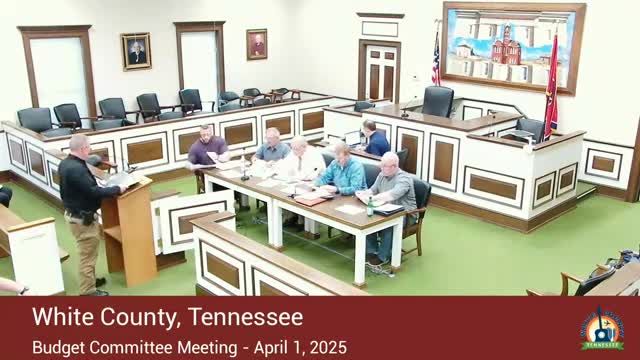Sheriff asks committee to adopt step pay structure, add deputies and expand fleet to retain staff
Get AI-powered insights, summaries, and transcripts
Subscribe
Summary
White County sheriff urged a step-tier pay plan to reward tenure, requested four deputies (one per shift), recommended matching local city pay scales plus $1 for competitiveness, and outlined vehicle and academy training costs.
White County’s sheriff told the budget committee on April 14 the county is losing experienced officers to nearby city and county agencies and urged a multiyear step-pay plan and additional deputies to improve retention and public safety coverage.
The sheriff described competitive pressures from the City of Sparta and nearby counties. He asked the committee to consider a pay structure with step raises tied to years of service—modeled on a neighboring agency he said uses six tiers over an eight-year plan—rather than a flat pay scale that leaves long-serving personnel earning nearly the same as recent hires. The sheriff said he had discussed a tiered approach with Sheriff Ray (citation in the meeting) and that the state pay increases (COLA) would apply across tiers.
To increase coverage, the sheriff asked for four additional deputies—one for each shift—and requested funding to send recruits to alternative academies when the state academy schedule is full. The sheriff said one alternative (Knoxville) quoted $3,000 for a 12-week academy; he asked that the county restore an “academy” line item (previously removed when the state funded slots) in the budget to cover out-of-state or private academy fees when needed.
The sheriff also discussed grant-funded School Resource Officer (SRO) positions—the committee heard that the state grant can cover up to $75,000 per school for SRO salary but usually does not cover equipment or training—and outlined vehicle costs for patrol cars and a fleet replacement program. He said fleet repair costs had increased and that a leasing or fleet program could yield more cars for less maintenance expense, while warning that leasing arrangements require state comptroller approval and could affect county debt reporting.
Committee members asked for further comparative pay data, suggested exploring longevity-pay mechanisms and work-session follow-up, and discussed fleet timing for fiscal 2026.
